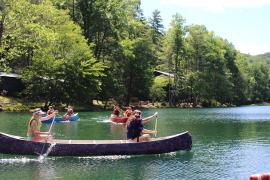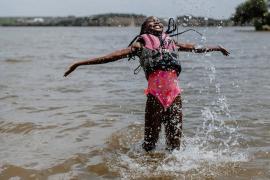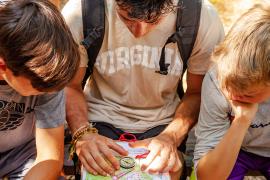In December, fellow Hoosier camp professional Sam Hirt (Camp Tecumseh YMCA) wrote this helpful PRJ blog post about the importance of building relationships with alumni, college career centers, and local employers to help camp outsiders understand the valuable, transferrable set of skills that camp staff build over the summer.
One additional opportunity we have that serves both our individual camp staff members and our industry as a whole is intentionally equipping our staff to “translate” their camp experience into words that college admission officers and hiring managers recognize and value.
Doing so will not only help that single staff member get accepted or hired, but also help any future applicants with “camp counselor” on their resume be seen in a new, more respectable light. As camp professionals, we understand the remarkable accomplishment that is leading 45 minutes of Gaga Ball for a full cabin group without a single knuckle scraped or tear shed, but the Human Resources department that is screening applicants down the road may not have the same frame of reference.
Picture this: at the end of your season, you lead a training for your seasonal camp staff that walks them through exactly how to translate their summer experience into the sorts of keywords and phrases that employers are looking for in resumes and cover letters. You also lay out a clear process for how you’ll handle reference letter requests that inevitably land in your inbox over the next few months. Here’s the best part: instead of creating this training from scratch, just make some small tweaks to the example text provided at the bottom of this blog and walk your staff through it.
A few examples of translating camp experience for future employers from the example text:
- Developed creative solutions to issues and problems; maintained a positive demeanor while doing so
- Employed risk management techniques to ensure camper safety
- Successfully balanced the roles of friend and confidant with the responsibility of risk-managing supervisor
While this may seem like the sort of thing that would hurt retention, as staff will find other jobs, you’ll likely witness the opposite trend appear: staff will feel valued and see that you care about their long-term professional growth, and that relationship will bring them back to camp year after year. It also helps them find meaningful non-summer employment so that when they return next summer, they bring back new skills and ideas that strengthen your camp as a whole. And on a larger scale, it spreads the truth that experience as a camp counselor sets folks up for success across all sorts of industries and trades. Camp staff are heroes, they just may need help telling their story.
Example Text: Translating Your Experience as a Camp Counselor
The following phrases are guidelines for how to describe your role in your cover letter and on your resume. Pick a handful of the phrases below that are true for your role and that you feel comfortable speaking about.
- Responsible for the health and safety of young people ages #-#
- Facilitated a safe summer camp experience
- Exercised independent decision-making skills
- Adapted to changing circumstances, both those that were controllable and those that we had no choice but to work around
- Developed creative solutions to issues and problems; maintained a positive demeanor while doing so
- Acted as a positive role model; led young people through their own social-emotional challenges and development
- Communicated effectively with parents and coworkers
- Simultaneously managed my own needs and the needs of others
- Employed risk management techniques to ensure camper safety
- Championed inclusion of campers with special needs and differing abilities to ensure full participation
- Worked with campers of a variety of ages, from varying walks of life, to develop a structured yet personalized program
- Successfully balanced the role of friend and confidant with the responsibility of risk-managing supervisor
- Worked as a team player to build a sense of community with my colleagues
- Collaborated with my supervisors, fellow counselors, parents, and campers to deliver an outstanding summer experience. Managed expectations and delivered favorable results
- Kept team morale high among unfavorable weather, less-engaging activities, and unexpected downtime
General tips and things to keep in mind:
- “Camp counselor” can be the exhausting, fulfilling, growth-oriented thing you did this summer, or it can be the person who watched some kids doing color sheets in a school cafeteria. If you don’t sell your experience, your prospective employer might assume the latter.
- Use your cover letter to deep dive into your true skills and describe how your camp experience translates into the job you’re interviewing for. The cover letter is a bridge between your resume and the posted job description.
- Be accurate and specific, but not needlessly verbose.
- Walk into the interview prepared to speak to the skills you listed. If you say “employed risk management techniques,” be ready to describe a situation where that happened. If you can’t talk about it, don’t list it.
Reference Letter or Letter of Recommendation
- I am more than happy to be listed as a reference, be contacted by future prospective employers, and/or write you a reference letter or letter of recommendation.
- Please give me a heads up if you’re listing me on an application — you already have permission, but please send me a text so I know to expect a call.
- [Camp Director Name], [Camp Director Title], [Email Address], [Phone Number]
- If you need a reference letter, email me with details about what you need and the job/program/opportunity you’re applying for. Send me three characteristics that you would like me to describe in the letter. As long as I agree that they are true, I’ll gladly write a letter.
This blog was written on behalf of Project Real Job whose purpose is to support camps in their efforts to recruit, hire, and retain staff.
Zach White currently serves as the Program and Camp Director at Jameson Camp, a 95 year-old independent non-profit overnight camp in Indianapolis, IN. Over the course of 14 summers at 4 different camps, Zach has worked across all front-line and administrative aspects of both day and overnight camps. He is an Eagle Scout, an avid backpacker, a published author, and a Leave No Trace Level 2 Instructor / Master Educator. Zach can be reached at [email protected].
Photo courtesy of Camp Wood YMCA in Elmdale, KS
The views and opinions expressed by contributors are their own and do not necessarily reflect the views of the American Camp Association or ACA employees.



